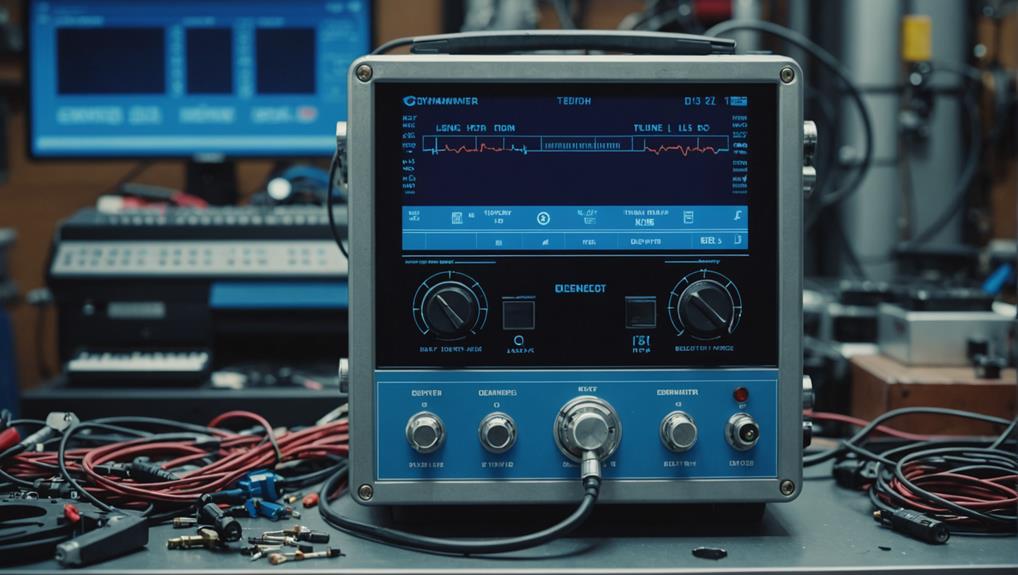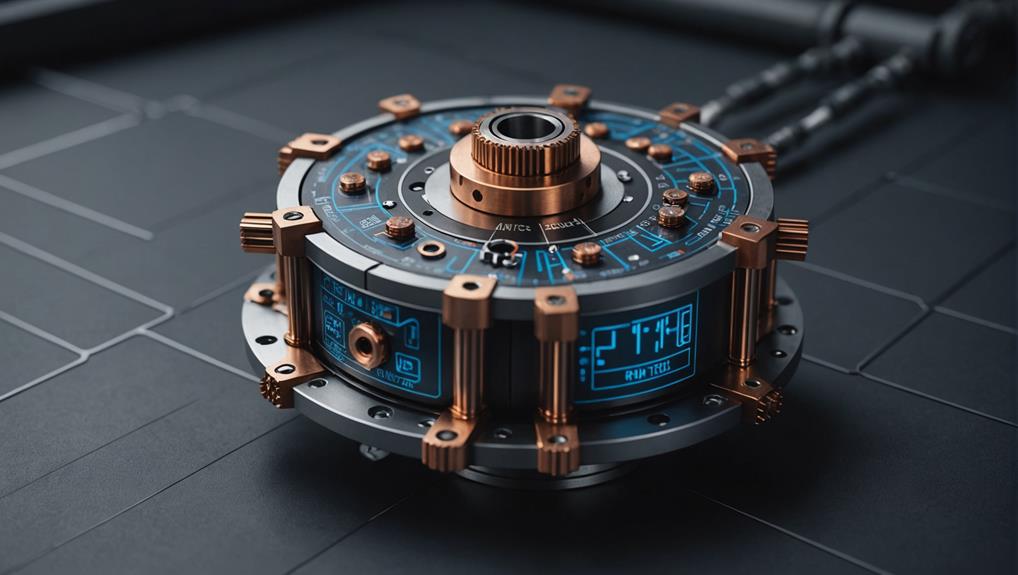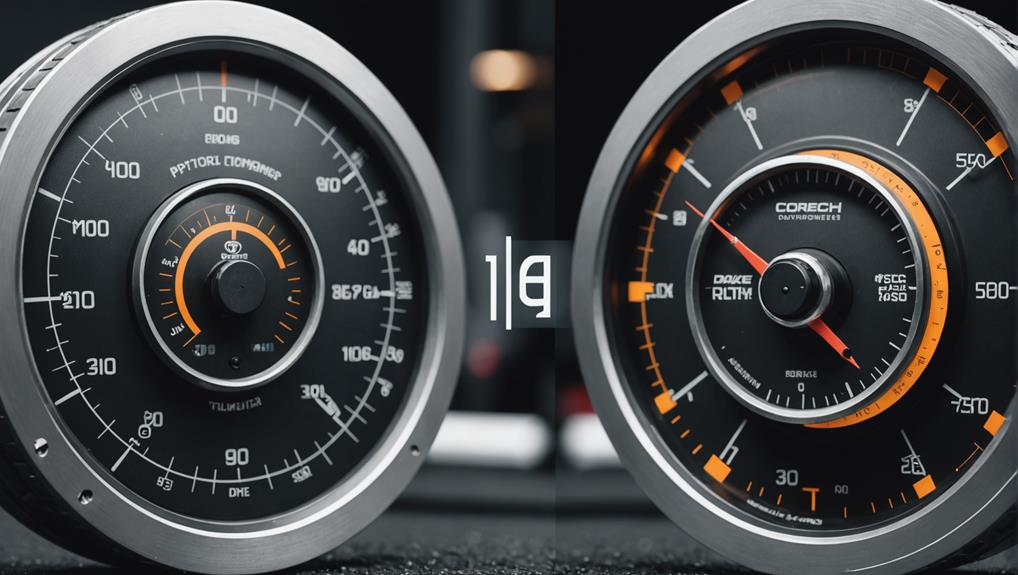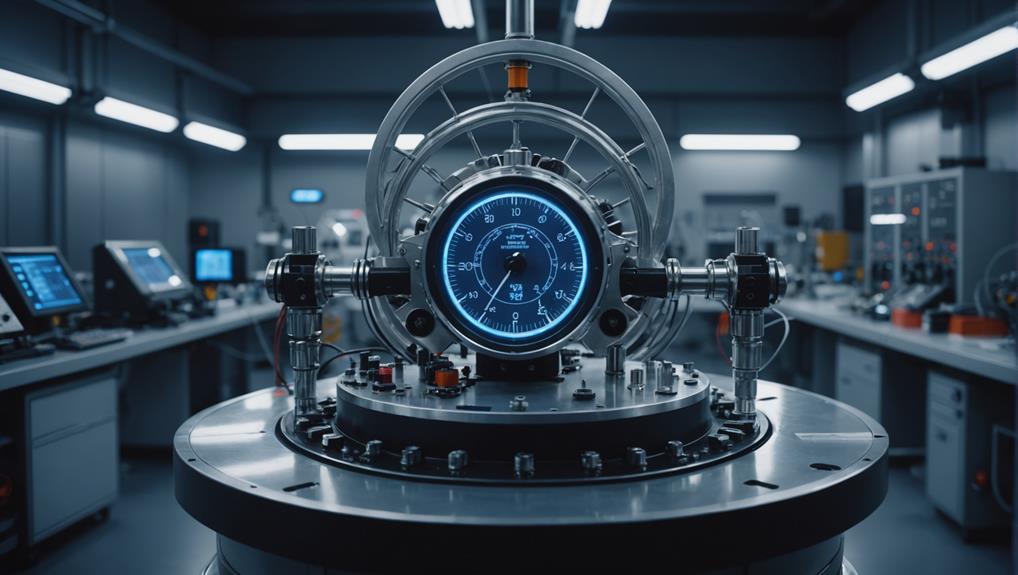
How Dynamometers Enhance Engine Diagnostics and Testing
Necessitating precise measurements, dynamometers unlock the secrets of engine performance, but what else can they reveal about engine diagnostics and testing?
Dynamometers have transformed vehicle tuning, revolutionising how performance is evaluated and enhanced. They enhance power and efficiency by offering precise adjustments to engine settings, achieving levels of optimisation never seen before.
Conducting dyno tests in a controlled setting ensures highly accurate improvements in overall vehicle performance. Data-guided modifications based on dyno analyses result in specific power enhancements, elevating engine efficiency, power measurement precision, and diagnostic capabilities.
By investing in high-quality dynamometer tools, tuners gain dependable performance validation, refined tuning, and enhanced vehicle performance. The capabilities of dynamometers have permanently changed the landscape of vehicle tuning.
Evolution of Tuning Practices
The advancement of vehicle tuning practices has seen a significant change with the introduction of dynamometers, enhancing the accuracy and efficiency of performance adjustments. Engine dynamometers, commonly referred to as dynos, have become essential for tuners seeking to maximise their vehicle's performance. Gone are the days of trial and error tuning methods; now, tuners rely on data-driven modifications to achieve the best results.
Dynamometer tuning enables tuners to replicate real-world driving conditions in a controlled setting, allowing for precise assessments and adjustments to engine parameters. This shift towards dyno testing has transformed the tuning industry, providing faster, more effective, and dependable performance upgrades. Tuners can now analyse every aspect of engine performance, resulting in significant enhancements across the entire vehicle. The use of engine dynamometers has not only streamlined the tuning process but has also set a new standard for achieving optimal vehicle performance.
Recommended Product: Dynapack Dynamometer
Benefits of Dyno Tuning
Dyno tuning offers tuners the ability to fine-tune engine settings with unparalleled accuracy, leading to enhanced performance outcomes. By conducting tests in a controlled environment, tuners can make informed adjustments based on data, resulting in optimal engine performance. This precision in tuning translates to improved overall vehicle performance and driving experience.
Importance of Data-Driven Adjustments
The reliance on data-driven adjustments in tuning practices ensures that modifications are backed by empirical evidence, leading to precise and effective results. Tuners can make informed decisions based on data collected from dyno testing, enhancing the performance of the vehicle in a targeted manner. This approach eliminates guesswork and maximises the potential for achieving peak performance levels.
Specific Example: Using an AEM Infinity ECU
Dynamometers play a pivotal role in analyzing power output and improving torque curves for better performance optimization.
By scrutinizing power output, tuners can pinpoint areas for improvement, leading to more efficient adjustments.
This process helps fine-tune the engine parameters to achieve optimal performance levels, ensuring that every tweak contributes to the vehicle's overall prowess.
Power Output Analysis
Enhancing vehicle tuning, analysing power output is vital for fine-tuning performance and efficiency with precision. When a vehicle is tested on a dynamometer using an engine dynamometer, it offers detailed insights into the power it produces. By examining factors like the air/fuel ratio, tuners can adjust the engine to achieve maximum power improvements. The data from dynamometers helps tuners make specific tweaks to the fuel and air mixture, as well as ignition timing, to ensure the engine performs at its best.
Understanding power output fluctuations on a dynamometer is essential for unlocking a vehicle's engine's full potential. For example, by identifying areas where power may be lacking, tuners can modify engine components to meet specific performance objectives. This tailored approach based on detailed analysis can lead to significant enhancements in a vehicle's overall power output and efficiency.
Enhancing the Torque Curve
Enhancing vehicle performance through dyno tuning involves fine-tuning the torque curve to optimize power delivery. By using dyno testing and tuning methods, mechanics can improve acceleration and drivability by smoothing out torque peaks and dips. This results in a more consistent and linear torque curve, providing better power throughout the RPM range. The refined torque curve not only boosts overall performance but also enhances the driving experience, making every ride more enjoyable and dynamic.
By adjusting fuel and ignition timing precisely, mechanics can maximize engine efficiency and reduce exhaust emissions. This process can also lead to improved fuel economy, making the vehicle more environmentally friendly. For example, tuning the torque curve of a turbocharged engine can result in increased low-end torque, enhancing responsiveness and overall performance. These adjustments not only benefit the vehicle's performance but also contribute to a more sustainable driving experience.
Utilizing dyno tuning to optimize the torque curve is like tailoring a bespoke suit for your vehicle. It ensures that the power delivery is smooth and consistent, enhancing the overall driving experience. For instance, by tuning the torque curve of a sports car, you can improve its acceleration and cornering capabilities, making it more agile on the road. This tailored approach to tuning ensures that every drive is exhilarating and enjoyable, with power readily available across the rev range.
Improving Accuracy in Vehicle Tuning
Precision enhancements in vehicle tuning involve meticulous adjustments based on data gathered from dyno testing. Dynamometers are pivotal in this process, precisely measuring engine parameters such as horsepower and torque to provide mechanics with crucial insights for enhancing performance. Let's delve into how tuning precision advancements transform the tuning process:
| Advantages of Precision Tuning Enhancements | Explanation |
|---|---|
| Refining Engine Parameters | Allows for specific adjustments to achieve optimal performance. |
| Instant Feedback | Immediate insights enable quick on-the-spot tweaks. |
| Integration of Software | Advanced tools facilitate precise tuning adjustments. |
| Maximising Power and Efficiency | Fine-tuning engine settings to achieve peak performance. |
| Data-Driven Decision Making | Utilising data from dyno testing for precise tuning. |
Benefits of Real-Time Performance Monitoring
Real-time monitoring of vehicle performance using dynamometers provides immediate insights to enhance engine efficiency and power output. These advanced machines, equipped with load cells, offer tuners live data on crucial metrics such as horsepower, torque, and air-fuel mixture. Picture this: as the engine revs on the dynamometer, tuners can analyse live power graphs, identifying the precise moment when the engine reaches its peak power. This instant feedback loop resembles having a personal coach for your car, directing you on how to adjust engine parameters for optimal performance gains.
The ability to access real-time data on horsepower, torque, and air-fuel mixture is essential for fine-tuning engine performance. By monitoring these key metrics instantly, tuners can make immediate adjustments to maximise the engine's power output. For example, using a dynamometer like the Dynojet Power Commander V allows tuners to view real-time data, enabling them to tweak fuel maps and ignition timing on the spot for improved engine performance.
Real-time performance monitoring not only helps in optimising engine efficiency but also aids in diagnosing potential issues promptly. By observing live data on horsepower and torque, tuners can quickly identify any anomalies or irregularities in the engine's performance. This proactive approach can prevent costly repairs down the line by addressing issues early on. For instance, monitoring live data with the AEM X-Series Wideband UEGO Air/Fuel Ratio Sensor Kit can help tuners detect lean or rich air-fuel mixtures in real-time, allowing them to make necessary adjustments to prevent engine damage.
Efficiency in power modifications is vital for achieving optimal performance gains in vehicles. By measuring power gains accurately and fine-tuning performance, dynamometers play a key role in enhancing engine efficiency.
Tuners can rely on dynamometer data to make precise adjustments that optimize power output and the entire vehicle performance.
Power Enhancements Assessment
Dynamometers are essential tools for accurately measuring the power gains achieved through engine modifications, providing precise details on increases in horsepower and torque. During full throttle acceleration, dynamometer testing records the exact engine horsepower and torque values, giving a detailed overview of the improvements made. This information is crucial for assessing the impact of power upgrades. By analysing the power graphs produced from dynamometer tests, mechanics can adjust engine settings to maximise performance. The accuracy provided by dynamometer testing ensures that every power-boosting modification is backed by solid evidence, enabling better-informed tuning decisions.
The significance of dynamometer testing lies in its ability to validate the effectiveness of modifications by presenting actual data on horsepower and torque improvements. This data is indispensable for enthusiasts seeking to optimise their engine's performance through upgrades. For example, a before-and-after comparison of dynamometer results can reveal a noticeable increase in horsepower after installing a performance exhaust system. Such concrete evidence helps car owners understand the impact of their investments in enhancing engine power.
Engine Tuning Precision
Fine-tuning engine adjustments based on dynamometer test results is crucial for achieving optimal performance gains. By carefully analysing power graphs and making precise modifications, tuners can unlock the full potential of their engines. For instance, adjusting fuel mapping after reviewing dynamometer data can lead to improved throttle response and overall power output. This attention to detail ensures that each modification contributes effectively to enhancing engine performance.
Data-Driven Decision Making
The data obtained from dynamometer testing empowers car enthusiasts and mechanics to make informed decisions when upgrading engine power. Instead of relying on guesswork, they can refer to specific horsepower and torque figures to guide their tuning choices. For example, knowing the exact horsepower increase gained from installing a cold air intake system enables enthusiasts to evaluate its impact accurately. This data-driven approach ensures that modifications are tailored to achieve the desired performance improvements.
Enhancing power modifications with precision and accuracy is crucial for maximising performance gains in vehicle tuning. When it comes to boosting a vehicle's power, the accuracy of dyno testing is vital. Here are some key aspects to consider:
In essence, the precision provided by dynamometers is akin to having a dedicated performance coach for your vehicle, guiding you towards achieving optimal power gains.
Advanced Diagnostic Capabilities in Dynamometers
Dynamometers have evolved to offer advanced diagnostic capabilities, transforming the process of identifying and resolving engine issues in vehicles. These tools provide in-depth insights into air/fuel ratios, power fluctuations, and EFI configurations, enabling operators to accurately pinpoint and address issues. By detecting vibrations and noises across different engine speeds, dynamometers enhance troubleshooting efficiency. Additionally, they simulate a variety of driving conditions, uncovering hidden performance issues that could lead to premature wear and inconsistent operation. The data collected during dyno runs is crucial for tuners, guiding them to make precise adjustments for optimal engine performance, ultimately improving throttle response and overall power output.
Benefits of Enhanced Diagnostics
Tuning Safety Enhancements
Enhancing the safety of vehicle tuning procedures involves meticulous attention to performance parameters and precise adjustments based on data-driven insights. In ensuring a smooth and secure tuning process, dynamometers play a vital role in making significant safety improvements. Here are some key ways they contribute:
With the use of dynamometers, tuning safety has seen remarkable enhancements, making it a valuable tool for anyone who uses one for vehicle adjustments.
Performance Validation and Verification
Performance validation and verification through dynamometer testing is a crucial step in guaranteeing the accuracy and reliability of engine output post-tuning. Dynamometers play a vital role in measuring actual brake horsepower and torque, providing precise data on the performance upgrades made to the vehicle. By analysing this information, tuners can assess the effectiveness of their adjustments and modifications, ensuring that the desired power gains are achieved. These tests are essential for optimising the engine's performance and validating the success of the tuning process. The data obtained from dynamometer testing helps in fine-tuning the vehicle for optimal results, ensuring that it performs at its best.
In essence, dynamometers serve as a dependable tool for verifying the impact of tuning on a vehicle's torque and brake horsepower output. They offer tangible results that validate the improvements made, giving enthusiasts the confidence that their modifications have been successful. By utilising dynamometer testing for performance validation, tuners can be certain that their efforts have paid off, and their vehicle is operating at peak performance levels.
Using a reputable dynamometer such as the Dynojet or Mustang Dynamometer can provide accurate and reliable data for performance validation. These dynamometers are known for their precision and consistency, making them ideal tools for assessing the effectiveness of tuning modifications. Tuning software like HP Tuners or Cobb Tuning can also be used in conjunction with dynamometer testing to fine-tune the vehicle's performance further. Overall, investing in quality dynamometer equipment and tuning software is essential for ensuring accurate and successful performance validation.
In conclusion, dynamometers have significantly changed the way vehicles are tuned, leading to enhancements in performance optimisation, precision, real-time monitoring, power modifications, diagnostic capabilities, safety, and validation. These advancements have transformed the tuning industry, simplifying the process for mechanics and enthusiasts to enhance vehicle performance and efficiency. With dynamometers, tuning has become more precise, efficient, and secure, ultimately benefiting both professionals and car enthusiasts alike.
Guide Towards Further Learning:
Spark curiosity for more knowledge by inviting the reader to contact Hyper Dyno. Feel free to reach out to us if you have any questions about Dynamometer Products, Custom Solutions, Installation Setup, Training and Certification, Technical Support and Maintenance, Software Updates, Rental Services, Dynamometer Testing Services, and Accessories and Parts. This is a call to action.

Necessitating precise measurements, dynamometers unlock the secrets of engine performance, but what else can they reveal about engine diagnostics and testing?

Navigating the complexities of torque measurement requires a deep understanding of the underlying principles and mechanisms to ensure accurate results.

Precise control and optimization of engine performance await, but only for those who unlock the secrets of dynamometer-driven data analysis.

Gaining insight into the differences between inertia and brake dynamometers is crucial for ensuring accurate testing results in various industries.

Tapping into the precise measurement capabilities of dynamometers, uncover the secrets to optimizing fuel efficiency and slashing emissions in the automotive industry.

Witness the importance of rigorous safety protocols and best practices in dynamometer testing to avoid catastrophic failures and ensure accurate results.

Harnessing the nuances of precision measurement is crucial to avoiding costly errors in dynamometer testing, but what are the key factors to consider?

Witness the transformative power of dynamometers in unlocking your vehicle’s hidden performance potential, but only if you know how to harness their precision.
Hyper Power, the leading name in dynamometer solutions, offers unparalleled precision and reliability for all your performance testing needs.